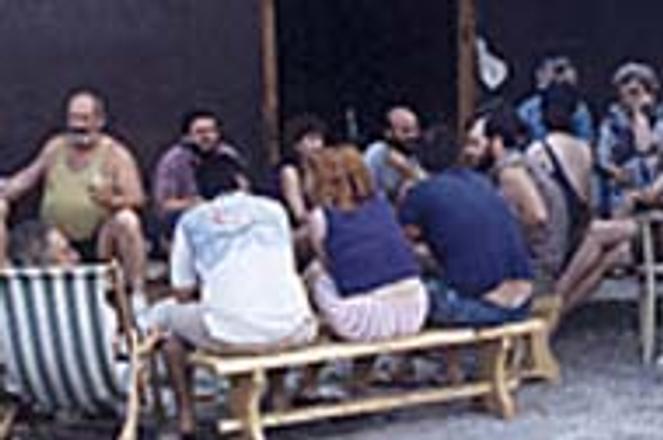Many differences exist between the capital city and the rest of the country, including wages, unemployment rates and, according to villagers like this party above, 'Slovak-ness'.photo: Spectator archives
Like every able-bodied Slovak male, 26 year-old reporter Marek Chorvatovič was required by law to spend a year in the Slovak Army. A native of Bratislava, Chorvatovič spent the first six months of his military service in Martin, a small city in the north of the country, where he lived with cadets from all corners of Slovakia.
"I got along great with everyone, and I still keep in touch with some of them," said Chorvatovič, reminiscing about his days as a soldier.
"But there was this one guy from Košice. When he was sober, he was fine. But every time he got drunk he would open my door right before he went to bed and shout obscenities having to do with my being from Brastislava, things like, 'Go to hell you punk from Bratislava.' This happened every single time he got drunk. Every single time. It was as if it were his job."
What Chorvatovič experienced in the army was 'Bratislava hatred', verbal abuse directed at residents of the nation's capital by their rural compatriots. Slovaks who live in villages have long viewed Bratislavans as haughty and condescending, and the stereotype has only strengthened this past decade as salaries, services and job opportunities mushroomed in the capital but shrank in the regions. Nowadays, a car licence plate identifying the owner as a Bratislava native is often sufficient to start an argument in a village pub.
Ironically, most Bratislavans are originally from other parts of Slovakia, and almost none have roots in the capital deeper than the 20th century. "Bratislava didn't start being dominated by Slovaks until the 1930's," explained Ján Bunček, assistant sociology professor at Comenius University. "Before then, there were more Germans and Austrians here, but since then it has been a gradual progression."
According to Bunček, Bratislava's multicultural past is the main reason Bratislavans are sometimes viewed as not being 'pure' or 'real' Slovaks, and thus of harbouring qualities foreign to the hearty, hospitable Slovak ideal.
To add to the impression that Bratislavans are not 'real' Slovaks, natives of the capital have a harsh accent that iritates the ears of some Slovaks, especially those from central Slovakia, where the language was first officially codified. Bratislavans rarely roll their consonants, have a more nasal aspiration and are more apt to use foreign words.
But the biggest tangible difference between Bratislava and the rest of the country lies in economic development and opportunity. According to the Slovak Statistics Bureau, the average salary in the nation's capital as of September 1999 was 13,451 Slovak crowns ($292), compared to 10,525 ($229) for Slovakia as a whole. In Prešov, the north-easternmost region of Slovakia, and one of the poorest, the figure stands at 8,683 ($189).
"People outside of Bratislava tend to think of people here as rich," said Bunček. "And while it's true that the economy here is much healthier and wages much higher, this is at least somewhat offset by a considerably higher cost of living."
Unemployment statistics also illustrate the economic differences. As of September, 1999 Bratislava had an unemployment rate of just 5.5%, while the national level was over 20%. In certain districts in the Banská Bystrica region, unemployment has risen into the mid-30's. For this reason as well as the higher wages, Bratislava draws a constant stream of labour, which has in turn helped to develop a culture more focused on professional achievement.
"Bratislava has been the capital of Slovakia since the days of Czechoslovakia, and it has traditionally been the city Slovaks come to to develop their careers," Bunček said. "Because of this, Bratislavans are viewed as extremely career-focused, overly ambitious people."
Zdenka Kamiačová, a 52 year-old clerk at Konsolidačná Banka in Bratislava, left the small village of Pribovce (near Martin) at 18 to attend university in Bratislava. There, she met her husband and eventually settled down. When asked about the differences between life in her former village and her current city, Kamiačova exhaled ponderously.
"In Bratislava, there is maybe a bit higher level of education," she said. "There are simply more schools here and more opportunities, in terms of both career and things to do, which leads to a broader outlook on things. People here follow international events more, for example."
What seems natural to Kamiačová, however, can come across as arrogant to the rest of the country. "Bratislavans think they are the belly-button of the world," said Ľubica M., a 44 year-old nurse living in a village near northern Slovakia's Žilina. "On the whole, Bratislavans are more conceited and unapproachable."
When asked if she would ever choose to live in Bratislava, Ľubica was emphatic. "No! I don't think I could ever live in a city such as Bratislava," she said. "It wouldn't be a good environment for me."
Kamiačová, for her part, is satisfied with her life in Bratislava. "I sometimes miss the mountains, and the calm, but that's about it. And those things are still there every time I go back, which is often."
She added that the mudslinging which goes on between residents of the capital and the regions seemed a bit silly given that people could now live wherever they wanted.
"Maybe people who don't live in Bratislava are a little envious. But you know, it's not as if the city is an exclusive club. Anyone can come here if they want to."


